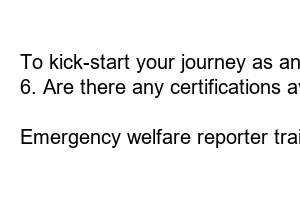긴급복지 신고의무자 교육
Title: Emergency Welfare Reporter Training: Equipping Journalists to Safeguard Society
Introduction:
In today’s fast-paced world, being prepared for emergencies is of paramount importance. Emergency welfare reporters play a crucial role in keeping society informed during crisis situations. With the right training and skills, these reporters can efficiently relay information, provide support, and create awareness among the masses. This blog post delves into the significance of emergency welfare reporter training and the positive impact it has on society.
1. The Role of Emergency Welfare Reporters:
Emergency welfare reporters act as a bridge between authorities and the general public during crises. Their main objective is to provide accurate, up-to-date information and resources to help individuals make informed decisions. By highlighting important safety measures, disseminating evacuation routes, and sharing emergency contact information, these reporters collaborate to ensure the safety and well-being of communities.
2. Skills Taught in Emergency Welfare Reporter Training:
Effective communication is a core skill taught in emergency welfare reporter training. This training equips reporters with the ability to relay information succinctly and sensitively. Additionally, training covers crisis management techniques, interview skills, ethical reporting practices, and emotional support strategies. **These skills empower reporters to deliver vital information confidently while minimizing panic and confusion among the public.**
3. Reporting Techniques for Emergency Situations:
In the midst of emergencies, the way information is reported can significantly impact society. Emergency welfare reporter training emphasizes clear and concise reporting, avoiding sensationalism, rumors, or speculations. By prioritizing verified information, these reporters ensure that the public receives accurate updates, enabling them to take necessary precautions and make informed decisions promptly.
4. Building Strong Collaborative Networks:
Emergency welfare reporter training encourages collaboration among reporters, emergency services, and community organizations. By fostering interdisciplinary relationships, reporters can tap into diverse resources and expertise during crises. This network also enables swift dissemination of information and helps in coordinating relief efforts effectively.
5. Emotional Well-being of Reporters:
Emergency welfare reporter training acknowledges the emotional toll that covering crisis situations can have on journalists. It emphasizes the importance of self-care, resilience, and building a support system. Recognizing and managing stress, trauma, and vicarious trauma are crucial aspects of this training, ensuring that reporters can continue their vital work while safeguarding their own mental well-being.
6. The Evolution of Emergency Welfare Reporting:
With the advent of technology and social media, emergency welfare reporting has witnessed significant changes. Training programs now incorporate guidelines on responsible social media usage and teach reporters to discern credible information from misinformation. **By harnessing the power of digital platforms, emergency welfare reporters can disseminate information rapidly and reach a wider audience during emergencies.**
FAQs:
1. Why is emergency welfare reporter training important?
Emergency welfare reporter training is essential to ensure accurate, timely, and ethical reporting during crises. It equips reporters with the necessary skills to support and inform communities effectively.
2. Are there any prerequisites for emergency welfare reporter training?
While prior journalism experience is beneficial, anyone passionate about serving society and reporting on emergencies can undergo this training.
3. How long does emergency welfare reporter training typically last?
The duration of training programs varies, but most cover essential skills over a span of a few weeks to a couple of months.
4. Can emergency welfare reporters work across different media platforms?
Absolutely! Emergency welfare reporters can work in print, broadcast, online, or even social media platforms, tailoring their reporting techniques to suit the medium.
5. How can I become an emergency welfare reporter?
To kick-start your journey as an emergency welfare reporter, reach out to journalism schools, local emergency services, or organizations that provide relevant training and opportunities.
6. Are there any certifications available for emergency welfare reporters?
Yes, some organizations offer certifications in emergency welfare reporting, which can further enhance your professional credibility.
Summary:
Emergency welfare reporter training equips journalists with essential skills to navigate crisis situations, enabling them to effectively share accurate information and resources with the public. By emphasizing clear communication, collaboration, ethical reporting, and self-care, reporters play a vital role in safeguarding society during emergencies.

